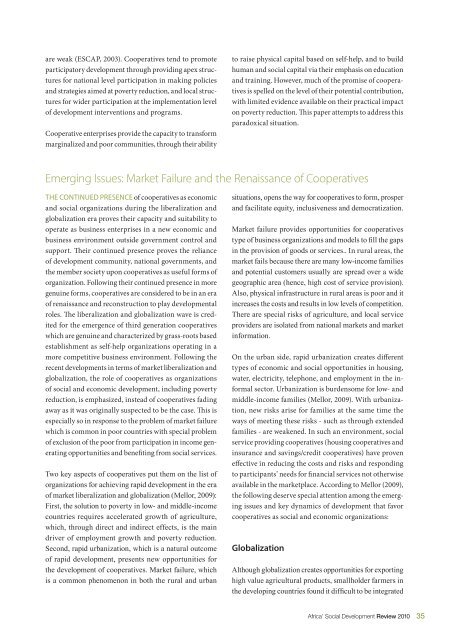The African Social Development Review - United Nations Economic ...
The African Social Development Review - United Nations Economic ...
The African Social Development Review - United Nations Economic ...
Create successful ePaper yourself
Turn your PDF publications into a flip-book with our unique Google optimized e-Paper software.
are weak (ESCAP, 2003). Cooperatives tend to promoteparticipatory development through providing apex structuresfor national level participation in making policiesand strategies aimed at poverty reduction, and local structuresfor wider participation at the implementation levelof development interventions and programs.Cooperative enterprises provide the capacity to transformmarginalized and poor communities, through their abilityto raise physical capital based on self-help, and to buildhuman and social capital via their emphasis on educationand training. However, much of the promise of cooperativesis spelled on the level of their potential contribution,with limited evidence available on their practical impacton poverty reduction. This paper attempts to address thisparadoxical situation.Emerging Issues: Market Failure and the Renaissance of CooperativesTHE CONTINUED PRESENCE of cooperatives as economicand social organizations during the liberalization andglobalization era proves their capacity and suitability tooperate as business enterprises in a new economic andbusiness environment outside government control andsupport. <strong>The</strong>ir continued presence proves the relianceof development community, national governments, andthe member society upon cooperatives as useful forms oforganization. Following their continued presence in moregenuine forms, cooperatives are considered to be in an eraof renaissance and reconstruction to play developmentalroles. <strong>The</strong> liberalization and globalization wave is creditedfor the emergence of third generation cooperativeswhich are genuine and characterized by grass-roots basedestablishment as self-help organizations operating in amore competitive business environment. Following therecent developments in terms of market liberalization andglobalization, the role of cooperatives as organizationsof social and economic development, including povertyreduction, is emphasized, instead of cooperatives fadingaway as it was originally suspected to be the case. This isespecially so in response to the problem of market failurewhich is common in poor countries with special problemof exclusion of the poor from participation in income generatingopportunities and benefiting from social services.Two key aspects of cooperatives put them on the list oforganizations for achieving rapid development in the eraof market liberalization and globalization (Mellor, 2009):First, the solution to poverty in low- and middle-incomecountries requires accelerated growth of agriculture,which, through direct and indirect effects, is the maindriver of employment growth and poverty reduction.Second, rapid urbanization, which is a natural outcomeof rapid development, presents new opportunities forthe development of cooperatives. Market failure, whichis a common phenomenon in both the rural and urbansituations, opens the way for cooperatives to form, prosperand facilitate equity, inclusiveness and democratization.Market failure provides opportunities for cooperativestype of business organizations and models to fill the gapsin the provision of goods or services.. In rural areas, themarket fails because there are many low-income familiesand potential customers usually are spread over a widegeographic area (hence, high cost of service provision).Also, physical infrastructure in rural areas is poor and itincreases the costs and results in low levels of competition.<strong>The</strong>re are special risks of agriculture, and local serviceproviders are isolated from national markets and marketinformation.On the urban side, rapid urbanization creates differenttypes of economic and social opportunities in housing,water, electricity, telephone, and employment in the informalsector. Urbanization is burdensome for low- andmiddle-income families (Mellor, 2009). With urbanization,new risks arise for families at the same time theways of meeting these risks - such as through extendedfamilies - are weakened. In such an environment, socialservice providing cooperatives (housing cooperatives andinsurance and savings/credit cooperatives) have proveneffective in reducing the costs and risks and respondingto participants’ needs for financial services not otherwiseavailable in the marketplace. According to Mellor (2009),the following deserve special attention among the emergingissues and key dynamics of development that favorcooperatives as social and economic organizations:GlobalizationAlthough globalization creates opportunities for exportinghigh value agricultural products, smallholder farmers inthe developing countries found it difficult to be integratedAfrica’ <strong>Social</strong> <strong>Development</strong> <strong>Review</strong> 201035
















